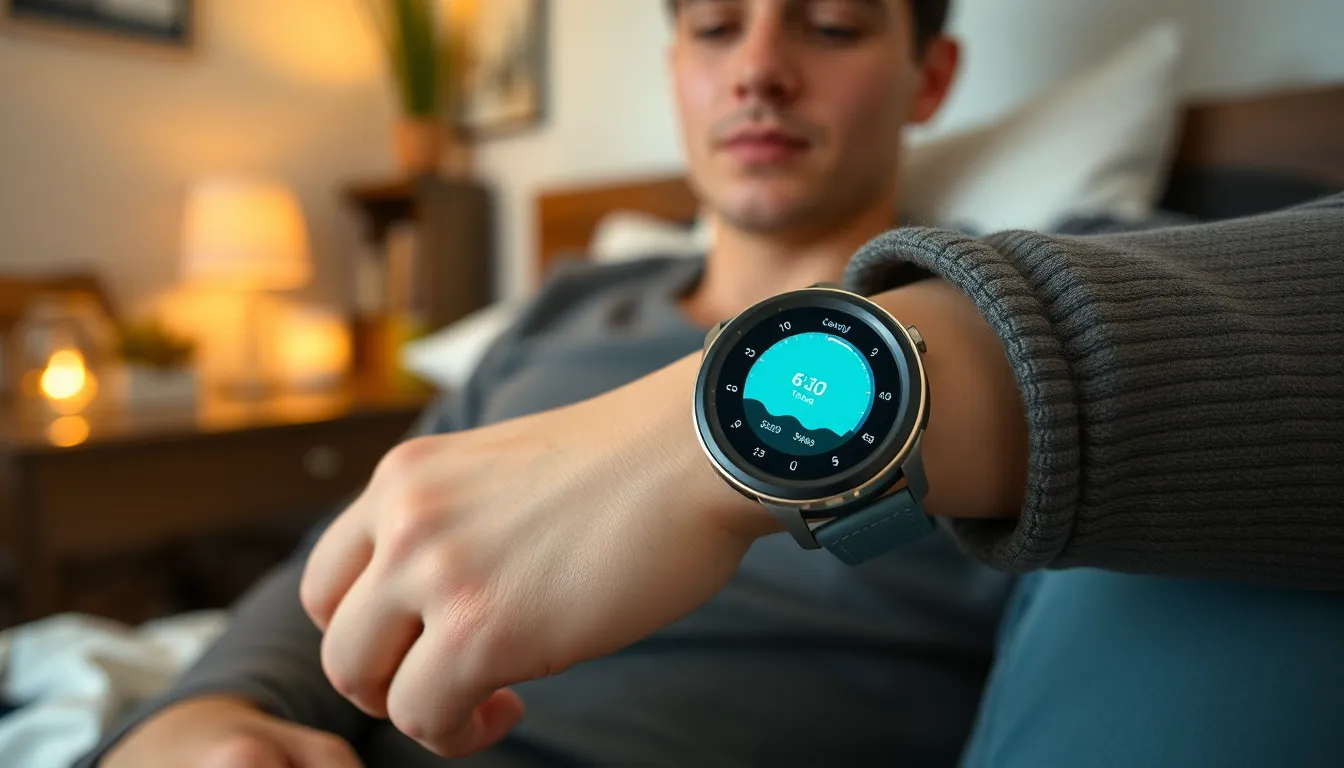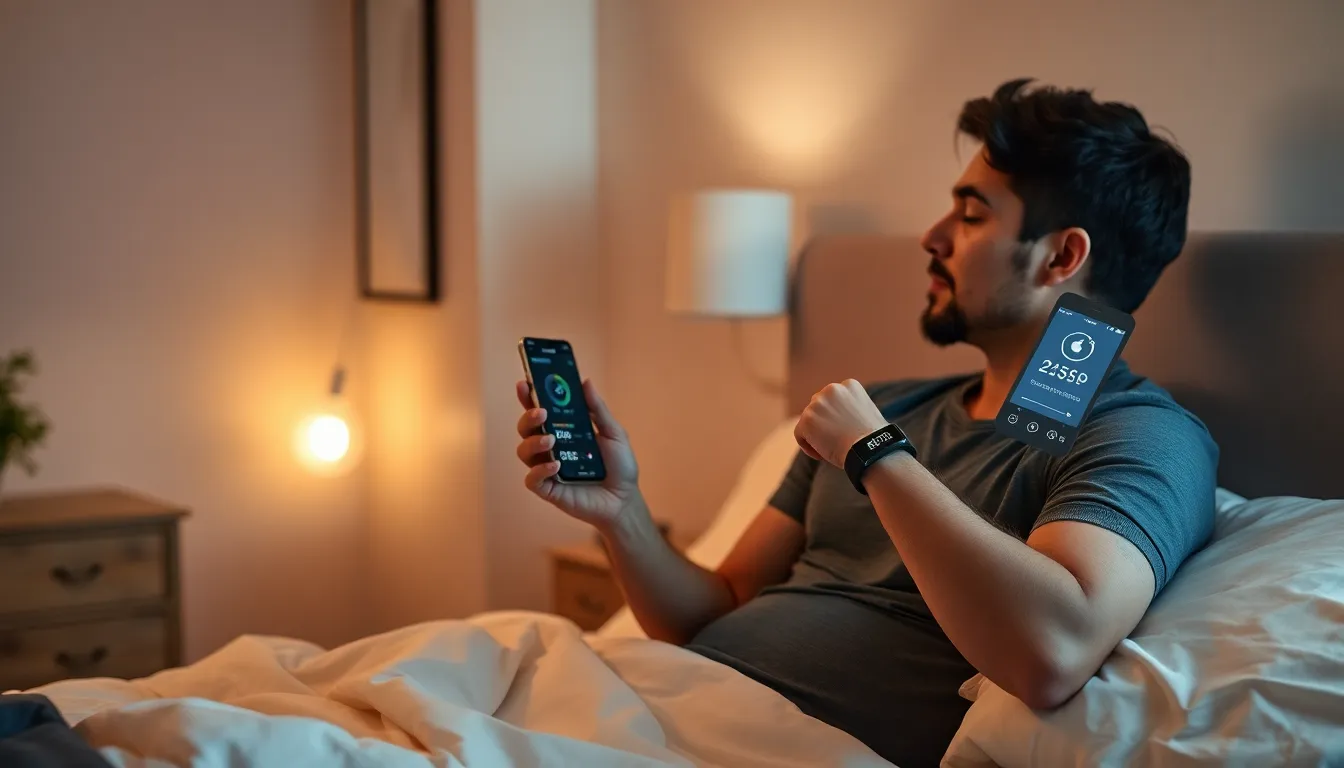Table of Contents
ToggleIn a world where counting sheep just doesn’t cut it anymore, wearable sleep trackers have swooped in like a superhero for the sleep-deprived. These nifty gadgets promise to turn restless nights into peaceful slumbers, all while providing insights that even your most talkative friend couldn’t offer. Imagine waking up feeling like a million bucks instead of a grumpy troll—sounds dreamy, right?
But wait! Are these trackers truly the magic wands they claim to be? With a variety of options flooding the market, it’s easy to get lost in a sea of blinking lights and fancy features. From monitoring heart rates to tracking sleep cycles, these devices might just be the key to unlocking the secret to better sleep. So, let’s dive into the world of wearable sleep trackers and uncover whether they’re worth the investment or just another gadget gathering dust on your nightstand.
Overview of Wearable Sleep Trackers
Wearable sleep trackers actively monitor sleep patterns, providing insights into sleep quality. These devices often incorporate sensors that track heart rate, movement, and sleep stages. Many sleep trackers leverage advanced algorithms to analyze data, offering users an overview of their sleep habits.
Real-time feedback has become a popular feature among users. Trackers send notifications or alerts, encouraging better sleep hygiene. Data visualizations in companion apps make it easy to understand sleep trends over time.
Many models feature additional functionalities beyond sleep analysis. Some wearable devices combine fitness tracking and sleep monitoring, appealing to a broader audience. These multi-functional aspects can enhance user engagement with the technology.
Certain brands stand out in the market due to their accuracy and usability. Companies like Fitbit, Garmin, and WHOOP have developed reputable devices known for reliability. Diverse price points exist, catering to various budgets while offering essential features.
Investing in a quality sleep tracker may lead to informed lifestyle changes. Users can identify patterns that disrupt their sleep and make adjustments accordingly. Health professionals see potential benefits in using these trackers for better sleep management.
Current trends reflect an increasing interest in sleep health. Individuals seek data-driven solutions to address sleep issues. Wearable sleep trackers are evolving, integrating with smart home systems to create personalized sleep environments.
Extensive research backs the effectiveness of sleep trackers. While they provide valuable insights, individual results can vary. Choosing the right device depends on personal preferences and specific sleep goals.
Types of Wearable Sleep Trackers

Wearable sleep trackers come in various forms, each catering to different user needs and preferences.
Smartwatches
Smartwatches incorporate sleep tracking features alongside their multifunctional capabilities. Users can access essential metrics such as heart rate and sleep stages through their wrist. Many smartwatches utilize advanced algorithms for in-depth sleep analysis, providing personalized feedback. Brands like Apple and Samsung offer models with sophisticated capabilities, appealing to tech-savvy individuals. These devices also integrate seamlessly with other applications, making it easier for users to monitor their overall health.
Fitness Bands
Fitness bands are primarily designed for active individuals who want to track both fitness and sleep patterns. These devices typically feature slim profiles and simplified interfaces, focusing on essential functionalities. Common functionalities include steps counting, calories burned, and varied sleep monitoring capabilities. Brands such as Fitbit and Xiaomi offer budget-friendly options that deliver accurate sleep data. Integration with companion apps encourages users to improve their sleep hygiene by analyzing trends and offering actionable insights.
Sleep Headbands
Sleep headbands specialize in providing a comfortable solution for tracking sleep specifically. Soft materials often characterize these devices, making them easy to wear overnight. Equipped with sensors, sleep headbands monitor brain activity, heart rate, and body movement throughout the night. Brands like Sleep Shepherd and Muse deliver specialized designs aimed at enhancing sleep quality. Many headbands offer guided meditations or soundscapes within their accompanying apps, promoting relaxation during sleep preparation.
Features to Consider
Understanding the key features of wearable sleep trackers aids in making informed decisions. Users benefit from exploring aspects like accuracy, battery life, and comfort to find a device that truly meets their needs.
Accuracy and Reliability
Accuracy directly impacts the effectiveness of sleep tracking. Devices should track various metrics like heart rate and sleep stages precisely. Look for models that utilize validated algorithms, ensuring data consistency. Notable brands often publish studies endorsing their accuracy, providing credibility. Reliable sleep data fosters trust and aids in identifying patterns that affect rest.
Battery Life
Battery life significantly determines overall usability. Many trackers need to last several days on a single charge to be practical. Models offering at least five days of battery life often provide convenience, reducing the frequency of charging interruptions. A quick-charge feature can enhance user experience, enabling minimal downtime. Users prefer devices with longer battery lives that don’t compromise on functionality.
Comfort and Design
Comfort influences consistent use of sleep trackers. Look for options with lightweight materials, ensuring users hardly feel them during sleep. Adjustable bands enhance fit, accommodating various wrist sizes without discomfort. Aesthetic appeal also matters; sleek designs may encourage regular wear. Ultimately, attractive and comfortable devices promote better user engagement and enjoyment.
Benefits of Using Wearable Sleep Trackers
Wearable sleep trackers offer significant advantages for individuals aiming to improve their sleep. These devices enhance understanding of personal sleep patterns and provide actionable feedback.
Improved Sleep Quality
Enhanced sleep quality is a primary benefit. Tracking sleep stages helps users identify disruptive patterns, leading to effective changes. With the ability to monitor heart rate and movement, these trackers refine sleep hygiene practices. Personalized recommendations, such as optimal bedtime and relaxation techniques, contribute to longer, more restful sleep. Many users notice improvements in overall well-being after adjusting habits based on tracker data. Finding the right device facilitates continuous monitoring, empowering users to take charge of their sleep health.
Data Insights
Data insights serve as invaluable tools for analyzing sleep behavior. Wearable trackers provide comprehensive reports on sleep duration and quality, allowing users to pinpoint issues. Detailed visualizations in companion apps make it easy to interpret patterns over time. Users gain a deeper understanding of how lifestyle factors, like exercise and nutrition, impact sleep quality. With this data, they can make informed adjustments to daily routines. Continuous feedback fosters motivation, driving users to maintain healthier sleep habits while enhancing overall quality of life.
Limitations and Challenges
Wearable sleep trackers face several limitations that potential users should consider.
Cost and Affordability
Many of these devices range significantly in price. While budget-friendly options can provide basic features, advanced models often cost several hundred dollars. High-end brands like Apple and Fitbit offer premium functionalities but may not fit everyone’s budget. Consumers must evaluate the potential return on investment regarding improved sleep and overall well-being. Some may deem the cost justified, while others find it excessive for limited benefits. It’s essential for buyers to weigh their financial situation against the features they desire in a sleep tracker.
Data Privacy Concerns
Wearable sleep trackers collect sensitive personal data, raising important privacy issues. Users often share their sleep patterns, heart rates, and other health metrics with apps linked to these devices. Companies may store this information, leading to questions about data security and how it’s utilized. Many individuals express concerns over third-party access to their data, fearing misuse or breaches. Ensuring manufacturers have robust privacy policies becomes vital for users interested in keeping their information confidential. Trust in the brand’s data handling practices is crucial when choosing a sleep tracker.
Wearable sleep trackers offer a promising avenue for those seeking to improve their sleep quality. By providing real-time insights and personalized feedback, these devices empower users to make informed choices about their sleep habits. While their effectiveness can vary, many individuals find value in the data-driven approach to enhancing their nightly rest.
As technology continues to evolve, the integration of sleep tracking with smart home systems may further personalize sleep environments. Users should weigh the benefits against potential drawbacks such as cost and data privacy. Ultimately, the right wearable sleep tracker can serve as a powerful tool in the pursuit of better sleep and overall well-being.





